| Class 1 Class 1 U.S. senators belong to the electoral cycle that has recently been contested in 2012, 2010 (special election), 2018, and 2024. The next election will be in 2030. | C | Class 2 Class 2 U.S. senators belong to the electoral cycle that has recently been contested in 2008, 2013 (special election), 2014, and 2020. The next election will be in 2026. |
|---|
| # | Senator | Party | Dates in office | Electoral history | T | T | Electoral history | Dates in office | Party | Senator | # |
|---|
| 1 | 
Tristram Dalton | Pro-
Admin. | Mar 4, 1789 –
Mar 3, 1791 | Elected in 1788.Lost re-election. | 1 | 1st | 1 | Elected in 1788. | Mar 4, 1789 –
Jun 1, 1796 | Pro-
Admin. | 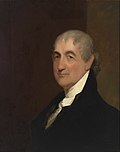
Caleb Strong | 1 |
|---|
| 2 | 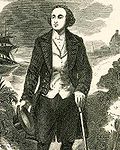
George Cabot | Pro-
Admin. | Mar 4, 1791 –
Jun 9, 1796 | Elected in 1790.Resigned. | 2 | 2nd |
|---|
| 3rd | 2 | Re-elected in 1793.Resigned. |
| Federalist | 4th | Federalist |
| Vacant | Jun 9, 1796 –
Jun 11, 1796 | Vacant | Vacant | Jun 1, 1796 –
Jun 11, 1796 | Vacant |
| 3 | 
Benjamin Goodhue | Federalist | Jun 11, 1796 –
Nov 8, 1800 | Elected to finish Cabot's term. | Elected to finish Strong's term.Retired to run for the U.S. House of Representatives. | Jun 11, 1796 –
Mar 3, 1799 | Federalist | 
Theodore Sedgwick | 2 |
|---|
| Also elected to full term in 1796.Resigned. | 3 | 5th |
| 6th | 3 | Elected in 1798. [7] Resigned to become U.S. Secretary of War. | Mar 4, 1799 –
May 30, 1800 | Federalist | 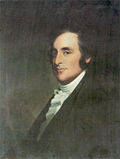
Samuel Dexter | 3 |
|---|
| Vacant | May 31, 1800 –
Jun 5, 1800 | Vacant |
| Elected to finish Dexter's term. [8] Resigned. | Jun 6, 1800 –
Mar 3, 1803 | Federalist | 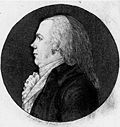
Dwight Foster | 4 |
|---|
| Vacant | Nov 8, 1800 –
Nov 14, 1800 | Vacant |
| 4 | 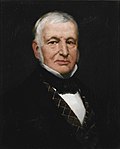
Jonathan Mason | Federalist | Nov 14, 1800 –
Mar 3, 1803 | Elected to finish Goodhue's term. |
|---|
| 7th |
| Vacant | Mar 2, 1803 –
Mar 3, 1803 | Vacant |
| 5 | 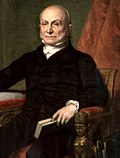
John Quincy Adams | Federalist | Mar 4, 1803 –
Jun 8, 1808 | Elected in 1803. [9] Resigned, having lost re-election to the next term. | 4 | 8th | Elected to finish Dexter's term. | Mar 4, 1803 –
Mar 3, 1811 | Federalist | 
Timothy Pickering | 5 |
|---|
| 9th | 4 | Re-elected in 1805. [10] Lost re-election. |
| 10th |
| 6 | 
James Lloyd | Federalist | Jun 9, 1808 –
May 1, 1813 | Elected to finish Adams's term, having already been elected to the next term. |
|---|
| Elected in 1808. [11] Resigned. | 5 | 11th |
| 12th | 5 | State Senate failed to elect. | Mar 4, 1811 –
Jun 28, 1811 | Vacant |
| Elected in 1811, to finish the vacant term.Retired or lost re-election. | Jun 29, 1811 –
Mar 3, 1817 | Democratic-
Republican | 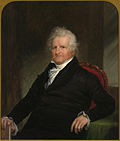
Joseph Bradley Varnum | 6 |
|---|
| 13th |
| Vacant | May 1, 1813 –
May 5, 1813 | Vacant |
| 7 | 
Christopher Gore | Federalist | May 5, 1813 –
May 30, 1816 | Appointed to finish Lloyd's term. |
|---|
| Elected to full term in 1815.Resigned. | 6 | 14th |
| Vacant | May 31, 1816 –
Jun 11, 1816 | Vacant |
| 8 | Eli P. Ashmun | Federalist | Jun 12, 1816 –
May 10, 1818 | Elected to finish Gore's term.Resigned. |
|---|
| 15th | 6 | Elected in 1816.Resigned to run for Mayor of Boston. | Mar 4, 1817 –
May 30, 1822 | Federalist | 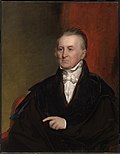
Harrison Gray Otis | 7 |
|---|
| Vacant | May 11, 1818 –
Jun 4, 1818 | Vacant |
| 9 | 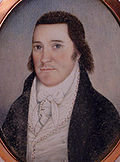
Prentiss Mellen | Federalist | Jun 5, 1818 –
May 15, 1820 | Elected to finish Gore's term.Resigned to become Chief Justice of Maine. |
|---|
| 16th |
| Vacant | May 16, 1820 –
Jun 12, 1820 | Vacant |
| 10 | 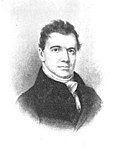
Elijah H. Mills | Federalist | Jun 12, 1820 –
Mar 3, 1827 | Elected to finish Gore's term. |
|---|
| Re-elected in 1820. Lost re-election in 1826. | 7 | 17th |
| Vacant | May 30, 1822 –
Jun 5, 1822 | Vacant |
| Elected to finish Otis's term. | Jun 5, 1822 –
May 23, 1826 | Federalist | 
James Lloyd | 8 |
|---|
| 18th | 7 | Re-elected in 1822.Resigned. |
National
Republican | 19th | National
Republican |
| Vacant | May 23, 1826 –
May 31, 1826 | Vacant |
| Elected to finish Lloyd's term. | May 31, 1826 –
Mar 3, 1835 | National
Republican | 
Nathaniel Silsbee | 9 |
|---|
| Vacant | Mar 4, 1827 –
Jun 8, 1827 | Vacant | 8 | 20th |
| 11 | 
Daniel Webster | National
Republican | Jun 8, 1827 –
Feb 22, 1841 | Elected late in 1827. |
|---|
| 21st | 8 | Re-elected in 1828.Retired. |
| 22nd |
| Re-elected in 1833. | 9 | 23rd |
| 24th | 9 | Elected in 1835.Resigned to become Governor of Massachusetts. | Mar 4, 1835 –
Jan 5, 1841 | National
Republican | 
John Davis | 10 |
|---|
| Whig | 25th | Whig |
| Re-elected in 1839.Resigned to become U.S. Secretary of State. | 10 | 26th |
| Vacant | Jan 5, 1841 –
Jan 13, 1841 | Vacant |
| Elected to finish Davis's term. | Jan 13, 1841 –
Mar 16, 1845 | Whig | 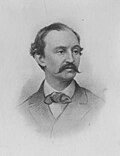
Isaac C. Bates | 11 |
|---|
| 12 | 
Rufus Choate | Whig | Feb 23, 1841 –
Mar 3, 1845 | Elected to finish Webster's term.Retired. |
|---|
| 27th | 10 | Elected to full term in 1841.Died. |
| 28th |
| 13 | 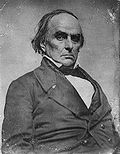
Daniel Webster | Whig | Mar 4, 1845 –
Jul 22, 1850 | Elected in 1845.Resigned to become U.S. Secretary of State again. | 11 | 29th |
|---|
| Vacant | Mar 16, 1845 –
Mar 24, 1845 | Vacant |
| Elected to finish Bates's term. | Mar 24, 1845 –
Mar 3, 1853 | Whig | 
John Davis | 12 |
|---|
| 30th | 11 | Re-elected in 1847.Retired. |
| 31st |
| Vacant | Jul 23, 1850 –
Jul 30, 1850 | Vacant |
| 14 | 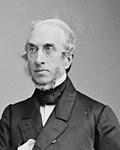
Robert C. Winthrop | Whig | Jul 30, 1850 –
Feb 1, 1851 | Appointed to continue Webster's term.Lost election to finish Webster's term. |
|---|
| 15 | 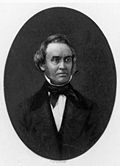
Robert Rantoul Jr. | Democratic | Feb 1, 1851 –
Mar 3, 1851 | Elected to finish Webster's term.Retired. |
|---|
| Vacant | Mar 4, 1851 –
Apr 24, 1851 | Elected late after the state legislature deadlocked on Daniel Webster's successor | 12 | 32nd |
| 16 | 
Charles Sumner | Free Soil | Apr 24, 1851 –
Mar 11, 1874 |
|---|
| 33rd | 12 | Elected in 1853.Resigned. | Mar 4, 1853 –
Jun 1, 1854 | Whig | 
Edward Everett | 13 |
|---|
| Vacant | Jun 1, 1854 –
Jun 3, 1854 | Vacant |
| Appointed to continue Everett's term.Successor was elected. | Jun 3, 1854 –
Jan 31, 1855 | Whig | 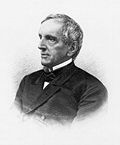
Julius Rockwell | 14 |
|---|
| Elected to finish Everett's term. | Jan 31, 1855 –
Mar 3, 1873 | Know Nothing | 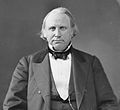
Henry Wilson | 15 |
|---|
| 34th | Republican |
| Republican | Re-elected in 1857. | 13 | 35th |
| 36th | 13 | Re-elected in 1859. |
| 37th |
| Re-elected in 1863. | 14 | 38th |
| 39th | 14 | Re-elected in 1865. |
| 40th |
| Re-elected in 1869.Died. | 15 | 41st |
| 42nd | 15 | Re-elected in 1871.Resigned to become the Vice President of the United States. |
| Liberal Republican | 43rd | Vacant | Mar 3, 1873 –
Mar 17, 1873 | Vacant |
| Elected to finish Wilson's term.Lost renomination. | Mar 17, 1873 –
Mar 3, 1877 | Republican | 
George S. Boutwell | 16 |
|---|
| Vacant | Mar 12, 1874 –
Apr 16, 1874 | Vacant |
| 17 | 
William B. Washburn | Republican | Apr 17, 1874 –
Mar 3, 1875 | Elected to finish Sumner's term.Retired. |
|---|
| 18 | 
Henry L. Dawes | Republican | Mar 4, 1875 –
Mar 3, 1893 | Elected in 1875. | 16 | 44th |
|---|
| 45th | 16 | Elected in 1877. | Mar 4, 1877 –
Sep 30, 1904 | Republican | 
George F. Hoar | 17 |
|---|
| 46th |
| Re-elected in 1881. | 17 | 47th |
| 48th | 17 | Re-elected in 1883. |
| 49th |
| Re-elected in 1887.Retired. | 18 | 50th |
| 51st | 18 | Re-elected in 1889. |
| 52nd |
| 19 | 
Henry Cabot Lodge | Republican | Mar 4, 1893 –
Nov 9, 1924 | Elected in 1893. | 19 | 53rd |
|---|
| 54th | 19 | Re-elected in 1895. |
| 55th |
| Re-elected in 1899. | 20 | 56th |
| 57th | 20 | Re-elected in 1901.Died. |
| 58th |
| Vacant | Sep 30, 1904 –
Oct 12, 1904 | Vacant |
| Appointed to continue Hoar's term. Elected to finish Hoar's term. [12] | Oct 12, 1904 –
Mar 3, 1913 | Republican | 
Winthrop M. Crane | 18 |
|---|
| Re-elected in 1905. [12] | 21 | 59th |
| 60th | 21 | Re-elected in 1907.Retired. |
| 61st |
| Re-elected in 1911. | 22 | 62nd |
| 63rd | 22 | Elected in 1913. Lost re-election. | Mar 4, 1913 –
Mar 3, 1919 | Republican | 
John W. Weeks | 19 |
|---|
| 64th |
| Re-elected in 1916. | 23 | 65th |
| 66th | 23 | Elected in 1918. Lost re-election. | Mar 4, 1919 –
Mar 3, 1925 | Democratic | 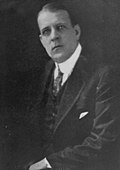
David I. Walsh | 20 |
|---|
| 67th |
| Re-elected in 1922.Died. | 24 | 68th |
| Vacant | Nov 9, 1924 –
Nov 13, 1924 | Vacant |
| 20 | 
William M. Butler | Republican | Nov 13, 1924 –
Dec 6, 1926 | Appointed to continue Lodge's term. Lost election to finish Lodge's term. |
|---|
| 69th | 24 | Elected in 1924.Retired. | Mar 4, 1925 –
Mar 3, 1931 | Republican | 
Frederick H. Gillett | 21 |
|---|
| 21 | 
David I. Walsh | Democratic | Dec 6, 1926 –
Jan 3, 1947 | Elected to finish Lodge's term. |
|---|
| 70th |
| Re-elected in 1928. | 25 | 71st |
| 72nd | 25 | Elected in 1930.Retired. | Mar 4, 1931 –
Jan 3, 1937 | Democratic | 
Marcus A. Coolidge | 22 |
|---|
| 73rd |
| Re-elected in 1934. | 26 | 74th |
| 75th | 26 | Elected in 1936. | Jan 3, 1937 –
Feb 3, 1944 | Republican | 
Henry Cabot Lodge Jr. | 23 |
|---|
| 76th |
| Re-elected in 1940. Lost re-election. | 27 | 77th |
| 78th | 27 | Re-elected in 1942.Resigned to return to active duty in the U.S. Army. |
| Vacant | Feb 4, 1944 –
Feb 7, 1944 | Vacant |
| Appointed to continue Lodge's term.Did not run for election to finish the term. | Feb 8, 1944 –
Dec 19, 1944 | Republican | 
Sinclair Weeks | 24 |
|---|
| Elected to finish Lodge's term.Didn't take seat until Jan 4, 1945 in order to remain Governor of Massachusetts. | Dec 19, 1944 –
Jan 3, 1967 | Republican | 
Leverett Saltonstall | 25 |
|---|
| 79th |
| 22 | 
Henry Cabot Lodge Jr. | Republican | Jan 3, 1947 –
Jan 3, 1953 | Elected in 1946.Lost re-election. | 28 | 80th |
|---|
| 81st | 28 | Re-elected in 1948. |
| 82nd |
| 23 | 
John F. Kennedy | Democratic | Jan 3, 1953 –
Dec 22, 1960 | Elected in 1952. | 29 | 83rd |
|---|
| 84th | 29 | Re-elected in 1954. |
| 85th |
| Re-elected in 1958.Resigned to become U.S. President. | 30 | 86th |
| Vacant | Dec 22, 1960 –
Dec 27, 1960 | Vacant |
| 24 | 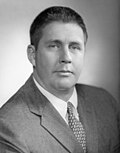
Benjamin Smith | Democratic | Dec 27, 1960 –
Nov 7, 1962 | Appointed to continue John Kennedy's term.Did not run for election to finish the term. |
|---|
| 87th | 30 | Re-elected in 1960.Retired. |
| 25 | 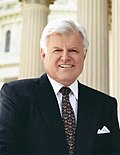
Ted Kennedy | Democratic | Nov 7, 1962 –
Aug 25, 2009 | Elected to finish his brother's term. |
|---|
| 88th |
| Re-elected in 1964. | 31 | 89th |
| 90th | 31 | Elected in 1966. | Jan 3, 1967 –
Jan 3, 1979 | Republican | 
Edward Brooke | 26 |
|---|
| 91st |
| Re-elected in 1970. | 32 | 92nd |
| 93rd | 32 | Re-elected in 1972.Lost re-election. |
| 94th |
| Re-elected in 1976. | 33 | 95th |
| 96th | 33 | Elected in 1978.Retired and resigned early to give successor preferential seniority. | Jan 3, 1979 –
Jan 2, 1985 | Democratic | 
Paul Tsongas | 27 |
|---|
| 97th |
| Re-elected in 1982. | 34 | 98th |
| Appointed to finish Tsongas's term, having already been elected to the next term. | Jan 2, 1985 –
Feb 1, 2013 | Democratic | 
John Kerry | 28 |
|---|
| 99th | 34 | Elected in 1984. |
| 100th |
| Re-elected in 1988. | 35 | 101st |
| 102nd | 35 | Re-elected in 1990. |
| 103rd |
| Re-elected in 1994. | 36 | 104th |
| 105th | 36 | Re-elected in 1996. |
| 106th |
| Re-elected in 2000. | 37 | 107th |
| 108th | 37 | Re-elected in 2002. |
| 109th |
| Re-elected in 2006.Died. | 38 | 110th |
| 111th | 38 | Re-elected in 2008.Resigned to become U.S. Secretary of State. |
| Vacant | Aug 25, 2009 –
Sep 24, 2009 | Vacant |
| 26 | 
Paul G. Kirk | Democratic | Sep 24, 2009 –
Feb 4, 2010 | Appointed to continue Ted Kennedy's term.Did not run for election to finish the term. [13] |
|---|
| 27 | 
Scott Brown | Republican | Feb 4, 2010 –
Jan 3, 2013 | Elected to finish Ted Kennedy's term.Lost re-election. |
|---|
| 112th |
| 28 | 
Elizabeth Warren | Democratic | Jan 3, 2013 –
present | Elected in 2012. | 39 | 113th |
|---|
| Appointed to continue Kerry's term.Did not run for election to finish the term. [14] | Feb 1, 2013 –
Jul 15, 2013 | Democratic | 
Mo Cowan | 29 |
|---|
| Elected to finish Kerry's term. | Jul 16, 2013 –
present | Democratic | 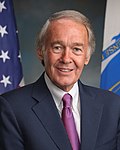
Ed Markey | 30 |
|---|
| 114th | 39 | Re-elected in 2014. |
| 115th |
| Re-elected in 2018. | 40 | 116th |
| 117th | 40 | Re-elected in 2020. |
| 118th |
| Re-elected in 2024. | 41 | 119th |
| 120th | 41 | To be determined in the 2026 election. |
| # | Senator | Party | Years in office | Electoral history | T | C | T | Electoral history | Years in office | Party | Senator | # |
|---|
| Class 1 | Class 2 |
|---|

























































